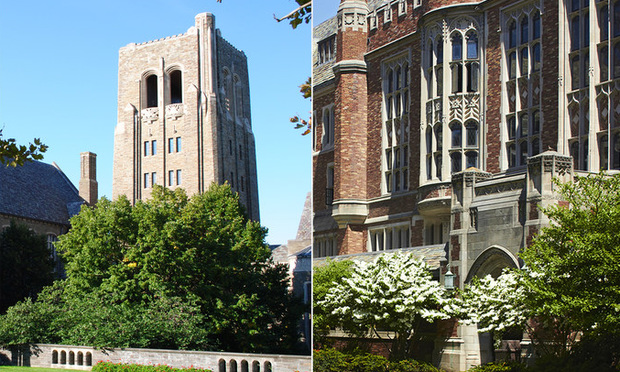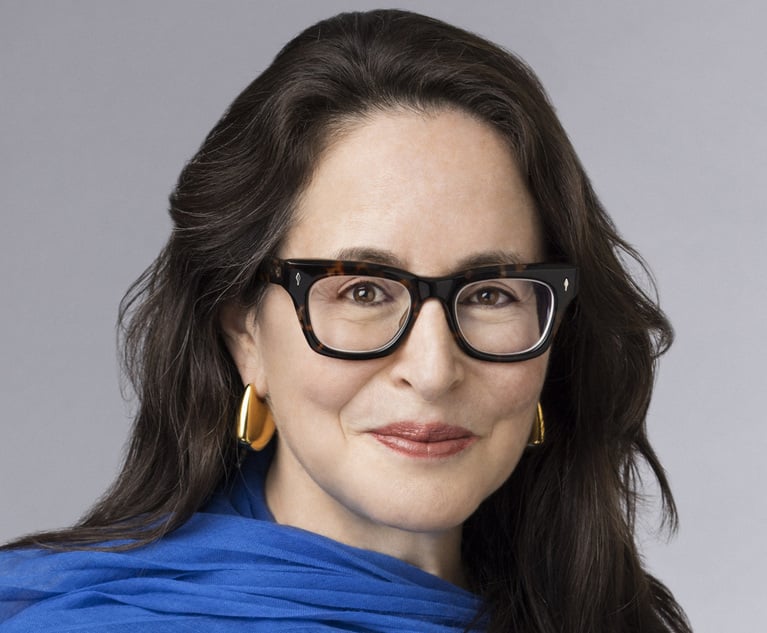Yale, Cornell Law Libraries Help Launch Global Rule of Law Initiative
In partnership with the United Nations, law librarians at Cornell and Yale are getting law journals, e-books and other legal content to people in low- and medium-income countries for free.
March 08, 2018 at 02:36 PM
3 minute read

Yale Law School and Cornell Law School are part of a new effort to get free legal information and legal content to academics, researchers and policymakers in developing countries in a bid to strengthen the rule of law around the globe.
The law libraries at both schools are partners in the Global Online Access to Legal Information project (GOALI), which formally launched March 6 in Geneva. The project provides universities, nonprofits, judges and others in 115 low- and middle-income countries access to thousands of law journals, e-books and databases, with a focus on international law, human rights, humanitarian law, and labor law.
“This initiative will make this vital information available to those who, until now, have not had access,” said Deborah Greenfield, deputy director general of the International Labour Initiative, a United Nations agency that is helping to shepherd the new project. “In turn, it will help promote social justice and inclusive societies, which is at the heart of the ILO's mandate.”
GOALI is the latest initiative from a public-private partnership called Research4Life, which already has information-sharing programs centered on health, agriculture, the environment, and innovation. Each program is a collaboration between a different UN agency and Yale and Cornell.
Bits and pieces of legal information and content are already available for free through various open-access initiatives, but GOALI is different, said Teresa Miguel-Stearns, director of Yale's Lillian Goldman Law Library.
“This is the first effort at bringing licensed legal content to institutions in developing countries,” she said.
Yale's role is twofold. Law library staff are reaching out to legal publishers and inviting them to contribute their content to the project for free. They are also responsible for looking through the content that publishers offer and selecting information relevant to GOALI's core issues, and making it available for users, Miguel-Stearns said.
Legal publishers have been very receptive to the idea of getting involved, she added. GOALI currently offers access to more than 10,000 legal titles from 60 different publishers.
“The publishers so far have been incredibly supportive,” Miguel-Stearns said. “They get excited about participating in these initiatives.”
Cornell's law library is focusing on providing training—both virtual and in person—to GOALI users, according to associate dean and law librarian Femi Cadmus.
The initiative, Cadmus said, “will promote access to justice by removing the economic and technological barriers to proprietary legal information in developing economies around the world.”
Students, researchers, judges, librarians, policymakers, and labor groups may request access to GOALI. If they are approved and come from a low-income nation, as defined by the UN, they will get free access to GOALI content. Users from middle-income nations pay a nominal fee.
All of the current GOALI content is in English, but leaders hope to expand into other languages down the line, according to Miguel-Stearns.
“It's important to our mission to bring legal content to people who need it, and to people who can use it to help promote the rule of law and social justice in their communities,” she said.
This content has been archived. It is available through our partners, LexisNexis® and Bloomberg Law.
To view this content, please continue to their sites.
Not a Lexis Subscriber?
Subscribe Now
Not a Bloomberg Law Subscriber?
Subscribe Now
NOT FOR REPRINT
© 2025 ALM Global, LLC, All Rights Reserved. Request academic re-use from www.copyright.com. All other uses, submit a request to [email protected]. For more information visit Asset & Logo Licensing.
You Might Like
View All
Morgan Lewis Shutters Shenzhen Office Less Than Two Years After Launch


University of Chicago Accused of Evicting Student for Attending Gaza-Israel Protest
3 minute read
State Appellate Court Rejects Reasoning for Attorney's Removal From Conservatorship
5 minute readTrending Stories
- 1'A Death Sentence for TikTok'?: Litigators and Experts Weigh Impact of Potential Ban on Creators and Data Privacy
- 2Bribery Case Against Former Lt. Gov. Brian Benjamin Is Dropped
- 3‘Extremely Disturbing’: AI Firms Face Class Action by ‘Taskers’ Exposed to Traumatic Content
- 4State Appeals Court Revives BraunHagey Lawsuit Alleging $4.2M Unlawful Wire to China
- 5Invoking Trump, AG Bonta Reminds Lawyers of Duties to Noncitizens in Plea Dealing
Who Got The Work
J. Brugh Lower of Gibbons has entered an appearance for industrial equipment supplier Devco Corporation in a pending trademark infringement lawsuit. The suit, accusing the defendant of selling knock-off Graco products, was filed Dec. 18 in New Jersey District Court by Rivkin Radler on behalf of Graco Inc. and Graco Minnesota. The case, assigned to U.S. District Judge Zahid N. Quraishi, is 3:24-cv-11294, Graco Inc. et al v. Devco Corporation.
Who Got The Work
Rebecca Maller-Stein and Kent A. Yalowitz of Arnold & Porter Kaye Scholer have entered their appearances for Hanaco Venture Capital and its executives, Lior Prosor and David Frankel, in a pending securities lawsuit. The action, filed on Dec. 24 in New York Southern District Court by Zell, Aron & Co. on behalf of Goldeneye Advisors, accuses the defendants of negligently and fraudulently managing the plaintiff's $1 million investment. The case, assigned to U.S. District Judge Vernon S. Broderick, is 1:24-cv-09918, Goldeneye Advisors, LLC v. Hanaco Venture Capital, Ltd. et al.
Who Got The Work
Attorneys from A&O Shearman has stepped in as defense counsel for Toronto-Dominion Bank and other defendants in a pending securities class action. The suit, filed Dec. 11 in New York Southern District Court by Bleichmar Fonti & Auld, accuses the defendants of concealing the bank's 'pervasive' deficiencies in regards to its compliance with the Bank Secrecy Act and the quality of its anti-money laundering controls. The case, assigned to U.S. District Judge Arun Subramanian, is 1:24-cv-09445, Gonzalez v. The Toronto-Dominion Bank et al.
Who Got The Work
Crown Castle International, a Pennsylvania company providing shared communications infrastructure, has turned to Luke D. Wolf of Gordon Rees Scully Mansukhani to fend off a pending breach-of-contract lawsuit. The court action, filed Nov. 25 in Michigan Eastern District Court by Hooper Hathaway PC on behalf of The Town Residences LLC, accuses Crown Castle of failing to transfer approximately $30,000 in utility payments from T-Mobile in breach of a roof-top lease and assignment agreement. The case, assigned to U.S. District Judge Susan K. Declercq, is 2:24-cv-13131, The Town Residences LLC v. T-Mobile US, Inc. et al.
Who Got The Work
Wilfred P. Coronato and Daniel M. Schwartz of McCarter & English have stepped in as defense counsel to Electrolux Home Products Inc. in a pending product liability lawsuit. The court action, filed Nov. 26 in New York Eastern District Court by Poulos Lopiccolo PC and Nagel Rice LLP on behalf of David Stern, alleges that the defendant's refrigerators’ drawers and shelving repeatedly break and fall apart within months after purchase. The case, assigned to U.S. District Judge Joan M. Azrack, is 2:24-cv-08204, Stern v. Electrolux Home Products, Inc.
Featured Firms
Law Offices of Gary Martin Hays & Associates, P.C.
(470) 294-1674
Law Offices of Mark E. Salomone
(857) 444-6468
Smith & Hassler
(713) 739-1250








